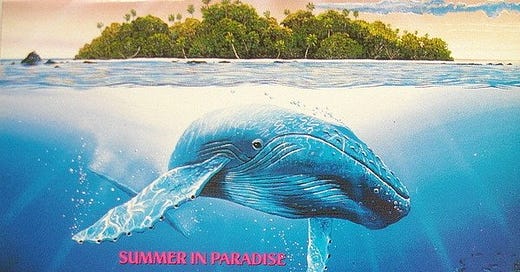So strange to hear that song again tonight
Travelling on business in a rented car
Miles from anywhere I’ve been before.
And now a tune I haven’t heard for years
Probably not since it last left the charts
Back in L.A. in 1969.
I can’t believe I know the words by heart
And can’t think of a girl to blame them on.
Every lovesick summer has its song,
And this one I pretended to despise,
But if I was alone when it came on,
I turned it up full-blast to sing along –
A primal scream in croaky baritone,
The notes all flat, the lyrics mostly slurred.
No wonder I spent so much time alone
Making the rounds in Dad’s old Thunderbird.
Some nights I drove down to the beach to park
And walk along the railings of the pier.
The water down below was cold and dark,
The waves monotonous against the shore.
The darkness and the mist, the midnight sea,
The flickering lights reflected from the city –
A perfect setting for a boy like me,
The Cecil B. DeMille of my self-pity.
I thought by now I’d left those nights behind,
Lost like the girls that I could never get,
Gone with the years, junked with the old T-Bird.
But one old song, a stretch of empty road,
Can open up a door and let them fall
Tumbling like boxes from a dusty shelf,
Tightening my throat for no reason at all
Bringing on tears shed only for myself.
Dana Gioia - Daily Horoscope (1986)
Published with permission by the author
Dana Gioia was born in Hawthorne, California, on December 24, 1950. He received a BA from Stanford University. Before returning to Stanford to earn an MBA, he completed an MA in comparative literature at Harvard University, where he studied with the poets Elizabeth Bishop and Robert Fitzgerald. In 1977, Gioia moved to New York to begin a career in business. For fifteen years Gioia worked as a businessman, eventually becoming a vice president of General Foods. In 1992, after publishing his first book of poetry, Daily Horoscope (Graywolf Press), in 1986, he left business to become a full-time writer.





It's a nicely sketched autobiographic moment. And it has an engagingly honest ring to it, which softens my heart to it.
A number of songs from that music era had some emotional power, both folk and rock--Simon and Garfunkel's songs, for one of the topmost examples, were exquisite and could stir up feeling. I couldn't help wondering which song it was that wrung some tears from the poem's author. The only clue is 1969, when it "last left the charts." No idea if that would rule out Orbison, whose "Only The Lonely" I've always had a feeling for. Am now asking myself if Simon and G's recordings first came out in the 60s or 70s.
Baez, Nelson, well, too many to mention. A lot of the music from those couple decades was strong.
Enjoyed the poem, no hardship at all to read. Didn't need to force my way through it. It carried me.
For most of us, maybe all of us, a melody, or even the briefest melodic fragment, can strike like lightning. Popular music has pride of place in such events because we paid so much attention to it in our youth. As Mr. Gioia so beautifully invokes in this piece, it can resurrect a long-forgotten past, not a memory exactly, but the upwelling of an emotional complex, of yearnings that belonged to another time, and to someone else entirely, the person we once were. These elusive moments arriving as if out of the blue, as Proust so famously describes, are accompanied by both exultation and sorrow. Sorrow for what we've lost, and the startling realization of the persistence (insistence) of a past that is never entirely past. How present, indeed, is our past. Many thanks, Mr. Gioia!